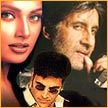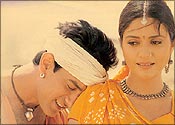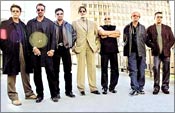
|
How original is Bollywood?
The year 2002 has a landmark number of Hindi films inspired by Hollywood films
|
Aseem Chhabra
Raj Kapoor did it. His lovable screen persona of a village bumpkin trapped within the corrupt surroundings of a big city in Shri 420 (1956), was inspired by Charlie Chaplin's world famous tramp. And Chori Chori, the 1957 romantic comedy with Kapoor and Nargis, in parts resembled Frank Capra's Oscar-wining classic It Happened One Night (1934).
Just recently Yash Chopra, another showman in the style of Kapoor, produced Mere Yaar Ki Shaadi Hai. By all accounts, the film was derived from the Hollywood hit My Best Friend's Wedding (1997), even though Chopra's younger son, actor and producer Uday, would not like to comment on the charge.
"We are not really saying anything as far as that is concerned," Uday Chopra said with a sheepish grin, when asked recently about the similarities between the two films.
The year 2002 has seen several Hindi films which owe their existence to recent Hollywood products, films like Raaz (What Lies Beneath), Awara Paagal Deewana (The Whole Nine Yards), Shakti (Not Without My Daughter), Humraaz (A Perfect Murder) and Deewangee (Primal Fear).
And soon to be released, director Sanjay Gupta's big budget production Kaante which, if word of mouth is to be believed, is a copy of Quentin Tarantino's 1992 cult classic Reservoir Dogs. Although not many people have seen Kaante, according to imbd.com, the film has six criminals with nicknames like Major, Ajju, the Bouncer, Bali, Andy and Mak.
Reservoir Dogs had mastermind Joe Cabot put together a group of five criminals with aliases like Mr Pink, Mr Orange, Mr White, Mr Blonde and Nice Guy Eddie.
Reports indicate that the producers of Kaante plan to release two different versions of the film in North America. A longer version, with songs, for the South Asian expatriate community, and a shorter version, minus the songs, for the mainstream American market.
"Anyone who will be honest will say that there are a number of Indian films that have taken ideas from Hollywood, whether it is direct steal or whether it is influenced by," says Hollywood producer Ashok Amritraj (Bandits, Moonlight Mile). "However, I do not know this film (Kaante). I do not know the depth of how far they have gone. So it is hard to comment."
Amritraj adds that he does not believe that a film like Kaante would create much of a ripple affect in Hollywood. "The idea of a Hindi film working to a mainstream American audience is highly unlikely in my mind," he says. "It has never happened thus far."
 Amritraj points out to the case of Ashutosh Gowariker's Lagaan. Earlier this summer, as an experiment to test the market, Sony Pictures Classics released Lagaan for the crossover audience in the US. But the film grossed an insignificant amount in the US box office, approximately $1 million. These figures include Lagaan's first run (in August 2001) at Indian theatres in North America.
Amritraj points out to the case of Ashutosh Gowariker's Lagaan. Earlier this summer, as an experiment to test the market, Sony Pictures Classics released Lagaan for the crossover audience in the US. But the film grossed an insignificant amount in the US box office, approximately $1 million. These figures include Lagaan's first run (in August 2001) at Indian theatres in North America.
"The easiest way to judge a film is by its box-office receipts," Amritraj says. "If a movie hasn't made $25 million to $30 million, it really hasn't crossed over."
The reason that no legal action has been taken against Bollywood filmmakers so far is because Hollywood studios are unaware of the plagiarism charges. "Indian movies are so far under the radar and no Hollywood executive is aware. I still think the audience for Hindi films is primarily Indian, however it is released, with or without songs," Amritraj continues.
He gives examples of blockbuster foreign films that have had huge successes in North America --- Amelie, Crouching Tiger, Hidden Dragon, Life Is Beautiful and Cinema Paradiso. "I am not saying that Bollywood films aren't good," he adds. "They are terrific, good quality films. But they have yet to attract a Western audience in North America."
Hollywood's copyright laws are often championed by the Motion Picture Association of America (MPAA), a Washington DC-based organisation that also assigns movie ratings to films released in the US.
 "Borrowing ideas, scripts and remaking them in different cultural contexts is a part of international cinema," says Rich Taylor, vice president of public affairs at MPAA. "But there is a right way of going about it," he adds. "That will be to license the right to use for the underlying material. The wrong way is to just take the ideas."
"Borrowing ideas, scripts and remaking them in different cultural contexts is a part of international cinema," says Rich Taylor, vice president of public affairs at MPAA. "But there is a right way of going about it," he adds. "That will be to license the right to use for the underlying material. The wrong way is to just take the ideas."
Without commenting on the case of Kaante vs Reservoir Dogs, Taylor says there are different ways in which a film's copyright can be tampered with, "from the actual picking up of a script and adding musical numbers to taking a concept that inspires the making of another film."
But any of those decisions and charges have to be first made by a Hollywood studio, he says.
Reservoir Dogs has been available on video for several years. Recently, Artisan Entertainment released a special edition DVD of the film. Paul Pflug, head of publicity at Artisan says he will not comment about the reported similarities between Kaante and Reservoir Dogs until he has seen the Indian film.
In any case, if any legal action is ever taken against the producers of Kaante, that would be the job of Miramax or the French film production company Canal, both of which own the copyright to Reservoir Dogs.
"We, at Miramax, especially Harvey (Weinstein) have a great appreciation for the creativity and the history of Bollywood projects," says Matthew Hiltzik, senior vice president at Miramax's corporate communication department. Like Pflug, Hiltzik does not want to comment on this case, without having seen Kaante. "I hate it when people comment on our films without having seen them. So I don't want to commit the sin that people commit to us. It is not like we anticipate a problem, but obviously we reserve the right to do something when we see the film."
 Hollywood may want to remain quiet about Kaante until the film is actually released, but in India there has been a lot of talk about the Bollywood-imitating-Hollywood trend.
Hollywood may want to remain quiet about Kaante until the film is actually released, but in India there has been a lot of talk about the Bollywood-imitating-Hollywood trend.
Daily Variety recently spoke to several Indian filmmakers about the issue. The Hollywood daily newspaper quoted Vikram Bhatt, director of Raaz and Awara Paagal Deewana as saying, 'Films are not about creativity, originality or vision. They are about entertaining audiences across the board. Once you understand and accept that an idea always existed before you did, then you look at the whole aspect of 'copying' in a different light.'
Bhatt acknowledges that the Indian film industry copies ideas and themes from other sources. 'The chief reason for this plagiarism is that there are not too many good original scripts around,' he says. 'There is a dearth of good writers in the (Indian) industry because, unlike Hollywood, the system doesn't invest in writers.'
Bhatt's uncle and producer of Raaz, Mahesh Bhatt dismissed the significance of the discussion. 'It's only entertainment, for heaven's sake, not some high art form to be worshipped with incense and hymns,' he told Daily Variety.
Earlier, while promoting Raaz, the older Bhatt was quoted in the press as saying the film was not inspired by a Hollywood film. "For the first time in my career, we have worked upon experiences that people felt and narrated, and developed a story out of it. Vikram Bhatt firmly believes in the supernatural and the one incident that happened to him convinced him to make a film out of it.'
The truth clearly lies somewhere in between. Finally it is the audience that decides if they like a film with an original plot or not. Raaz, incidentally, is one of the biggest Bollywood hits in India of 2002.
Bollywood has other defenders, including some in the US. Philip Lutgendorf, associate professor of Hindi and Modern Indian Studies at the University of Iowa and a lover of Bollywood cinema, disagrees with the allegations against the Indian film industry.
 "If you really know Hollywood and Bollywood films, you realise that they (the Hindi film industry) may borrow certain things, certain ideas and techniques. But in fact, Indian cinema is fiercely independent of Hollywood," Lutgendorf says. "It is perhaps the most independent cinema of the mass cinemas of the world, in that it sticks to its own narrative agenda and its aesthetics strategies."
"If you really know Hollywood and Bollywood films, you realise that they (the Hindi film industry) may borrow certain things, certain ideas and techniques. But in fact, Indian cinema is fiercely independent of Hollywood," Lutgendorf says. "It is perhaps the most independent cinema of the mass cinemas of the world, in that it sticks to its own narrative agenda and its aesthetics strategies."
"Filmmakers borrow all the time. The Magnificent Seven is borrowed from Seven Samurai of (Akira) Kurosawa and nobody thinks that is bad. Artistes pick things, take ideas and do things with them. When Hindi filmmakers borrow things, they always remake them into something different which is culturally relevant and addresses very different set of concerns."
Lutgendorf believes that Bollywood filmmakers borrow from Hollywood because they perceive that the centre of world style, fashion and wealth is in the West and they want to keep up with it. "That said," he adds, "it is still the case that nearly all borrowing is filtered through a heavy cultural sieve involving what Indian audiences expect or will accept as well as the tastes of the directors themselves"
Nearly 20 years ago, Oscar winner for Lifetime Achievement Satyajit Ray alleged that Steven Spielberg had plagiarised portions of ET from a script that the Bengali director wrote in the 1960s.
Spielberg denied the changes and to date ET has grossed $757 million worldwide.
The debate on Bollywood borrowing from Hollywood will continue until a studio head in Los Angeles may decide to act on these charges. Hopefully, that might address another unresolved debate.